
I understand why content marketers may avoid SEO: it seems complicated and time-consuming.
But I’ve got good news. Today, you’ll learn why content marketers like you are well-positioned to use SEO tactics — possibly even more so than *cough* an SEO like me.
Keyword research doesn’t have to be a marathon. A brisk, 30-minute walk can provide incredibly useful insights.
Even though keyword research benefits may not be obvious, the work you perform will help connect you to a wider audience on a deeper level.
Discovering how many people (a month) search for something, the words they use, and the questions they ask are important keys to more powerful content.
Why keyword research is essential
My previous company, Pryde Marketing, leveraged online data strategically for private medical practices.
When we were hired to do keyword research for an MRI company, we discovered that hundreds of people a month were searching “open vs. closed mri” but no sites provided any good answers, content, or photos for these searchers.
We decided to create a “Open vs. Closed MRI” page for our client that continues to see more than double the traffic of the homepage. And, it has brought in more than 50,000 unique visitors.
We were not successful because we thought of this content idea.
We were successful because we paid attention to the keyword data.
4 keyword research hacks
As Jerod Morris explained yesterday, there are keyword research tools built right in to the Rainmaker Platform and StudioPress Sites that you can use as you write and edit.
I’m going to show you some other tools as we go through the process of keyword research with an example client.
Example client: Hunter & Company (wedding & event planning)
Objective: Write better content for their website to improve digital marketing efforts.
Each of the four hacks below will take you 30 minutes or less to complete.
Hack #1: Blog category keyword research
Having five to 10 data-driven blog categories can help you organize your blog, rank for popular topics, and make it easier for readers to find more relevant content.
Evaluate top industry websites (8 minutes)
First, identify the most common navigation items and blog categories on leading industry sites.
Here’s a screenshot from The Knot:
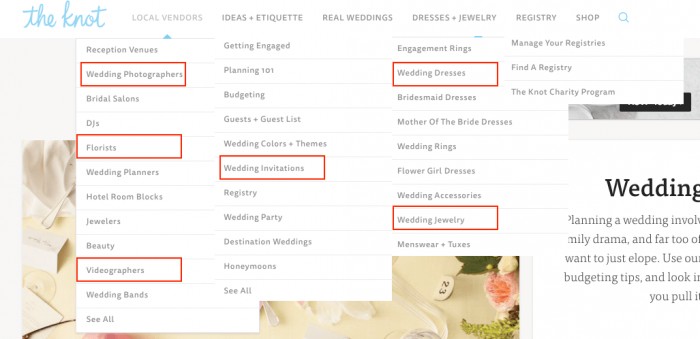
Advanced search operators (3 minutes)
While exploring top websites, you can use advanced Google operators to dig deeper.
For example, Brides.com has topic pages such as “wedding beauty.” To view all of Brides.com’s topics, type “site:brides.com/topic” into Google:
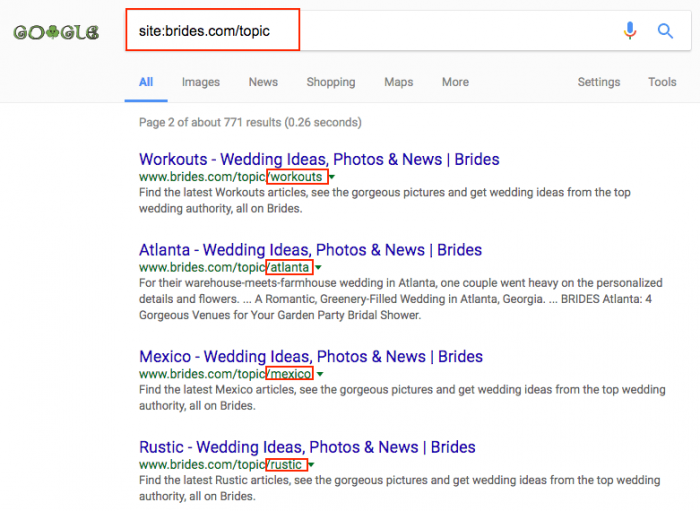
Google suggestions (7 minutes)
Now, Google “wedding” — and don’t hit enter!
Instead, make a note of the drop-down search suggestions. To get the most popular and/or trending wedding related searches, you can also search “wedding a” (don’t hit enter), “wedding b” (don’t hit enter) … all the way to “wedding z.”

Once you’ve aggregated keywords by using the tactics above, you’ll have a solid list:
wedding venues, wedding photographers, wedding dj, wedding beauty, wedding videographers, wedding bands, wedding budget, wedding invitations, wedding registry, wedding colors, wedding decorations, wedding party, wedding ideas, wedding cakes, wedding centerpieces, wedding hairstyles, wedding bouquets, engagement rings, wedding dresses, bridesmaid dresses, mother of the bride dresses, wedding rings, flower girl dresses, wedding accessories, wedding jewelry, wedding tuxedos, wedding registry, wedding ceremony, wedding reception, wedding cake, wedding food, wedding favors, wedding flowers
Let’s determine which categories are most popular by average monthly Google searches.
In Google Keyword Planner or Moz Keyword Explorer, you can view average monthly search volume (how many times a query like “wedding flowers” is searched for a month).
Google Keyword Planner (5 minutes):
Step 1: In Google Keyword Planner, paste your saved keyword list into “Enter one or more of the following” and click “Get Ideas.”
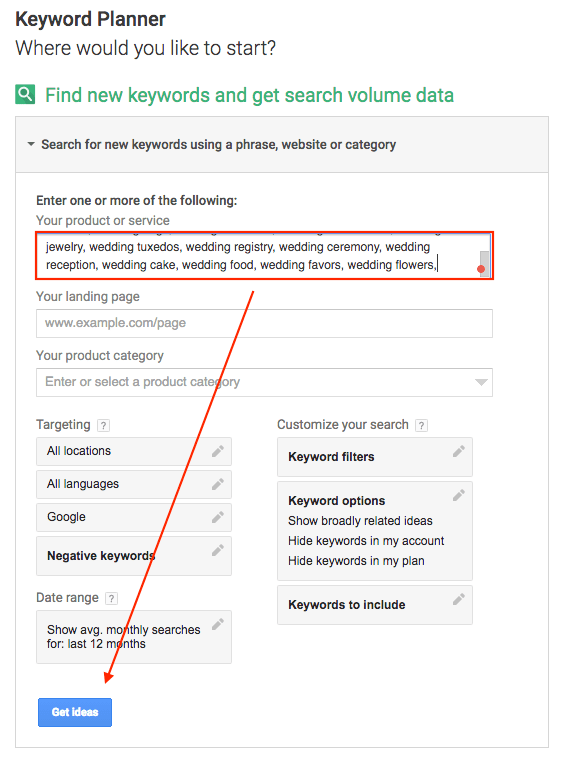
Step 2: Evaluate and save search volume data while being mindful of the large search data ranges and limited data.
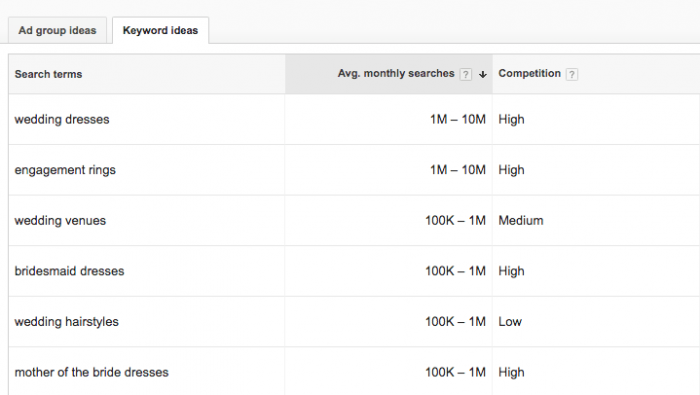
Note: Google will occasionally change your keywords to something different; “wedding videographers” was changed to “wedding videos” in this case. It’s important to make a note of those changes when you decide on the exact category names.
You should also explore the keywords below your immediate keyword search section. Sort by “Avg. monthly searches” (highest to lowest) to make sure you aren’t missing any other big categories.
Moz Keyword Explorer (7 minutes):
Step 1: In Moz Keyword Explorer, create a new list.

Step 2: Paste your keyword list into the “Enter Keywords” box.
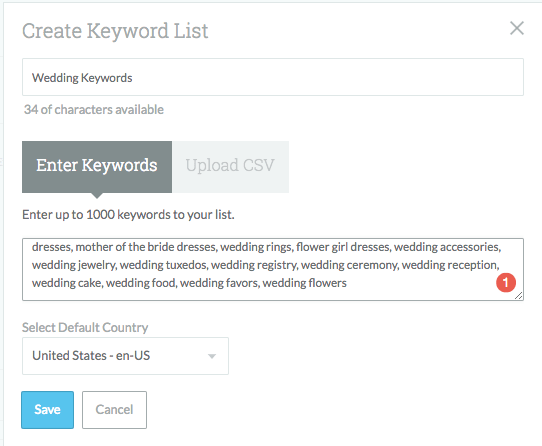
Step 3: Have a quick water break, because Moz Keyword Explorer will take a minute to gather data. Once the data is ready, sort by and evaluate average monthly search volume.
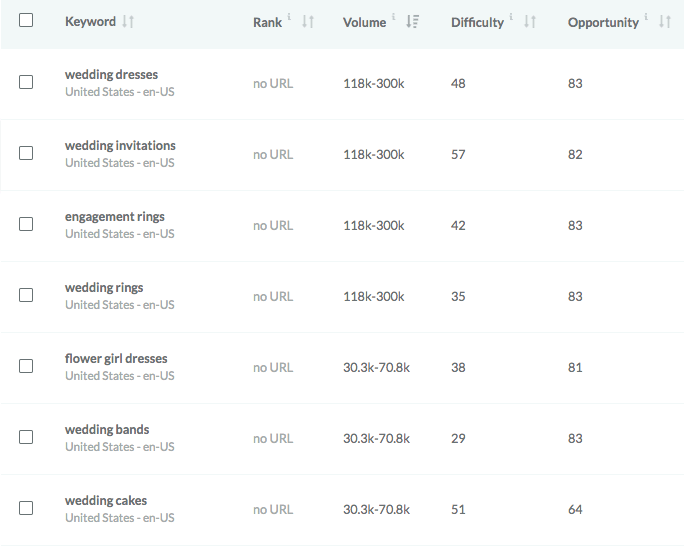
To set our blog categories, we need to finalize:
- Which topics are the most popular?
- Which topics are the most relevant for a wedding planner site?
With those questions in mind, I’ve chosen six of the most popular wedding topics, and there are several sub-categories within “Wedding Decorations.”
- Wedding Dresses
- Wedding Invitations
- Wedding Photography
- Wedding Cakes
- Wedding Venues
- Wedding Decorations (Wedding Flowers, Wedding Colors, Wedding Centerpieces, Wedding Venues)
Hack #2: FAQ keyword research
Answering the questions that are most commonly searched about your product or service will provide value to your readers and solidify you as an authority in your niche.
Here’s how to gather the most commonly asked questions on a topic.
Use AnswerThePublic.com (10 minutes)
Search for your product or service on AnswerThePublic.

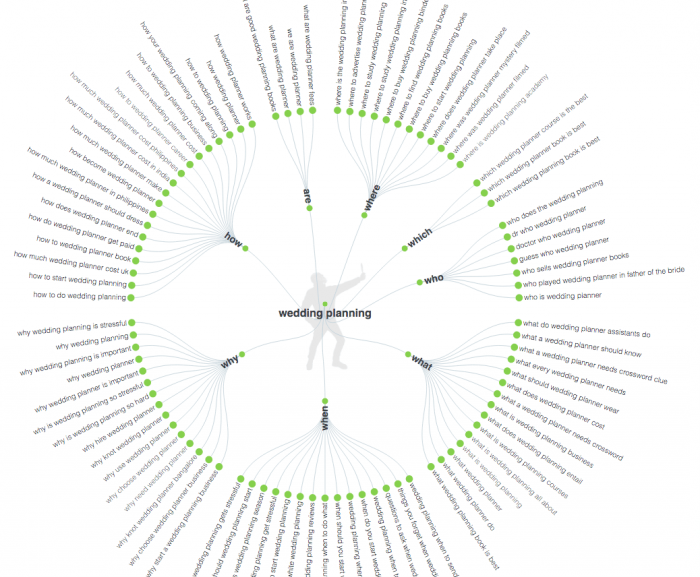
While the visuals in the snazzy question wheel above are fun, it’s easier to review the questions by clicking the top right, yellow “export to csv” button and deleting the extra questions you don’t need.
Moz Keyword Explorer (10 minutes)
Step 1: Search and filter “display keyword suggestions” by “are questions.”
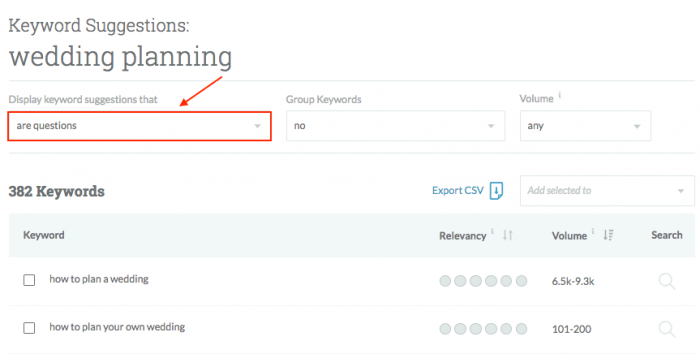
Step 2: Add relevant questions to a new keyword list.

Step 3: Add relevant AnswerThePublic questions to the list.
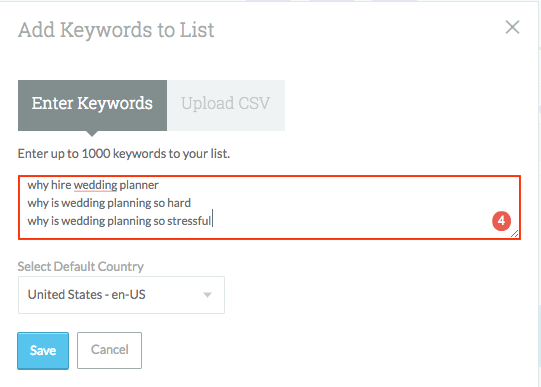
Your research is done!
I wouldn’t worry about evaluating search volume too closely for FAQs because questions are typically more long tail (they have a lower search volume and are usually easier to rank for). Which, in multitudes, can be very valuable to your site.
Now you can start adding your newly discovered FAQs to an FAQ page. (Try to avoid very similar types of questions.)
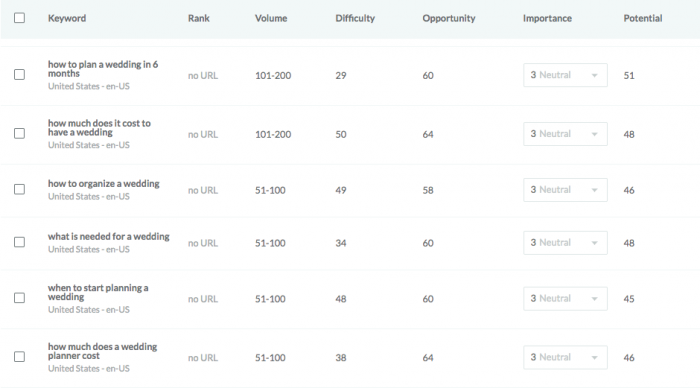
Hack #3: Competitive content research
Ready to glean insights from your competitor?
Evaluate your competitor’s 10 most popular pages on SimilarWeb (5 minutes)
SimilarWeb allows you to uncover the specific type of content your audience finds on a competitor’s website.
Here are the 10 most popular pages on OneFineDayEvents.com:
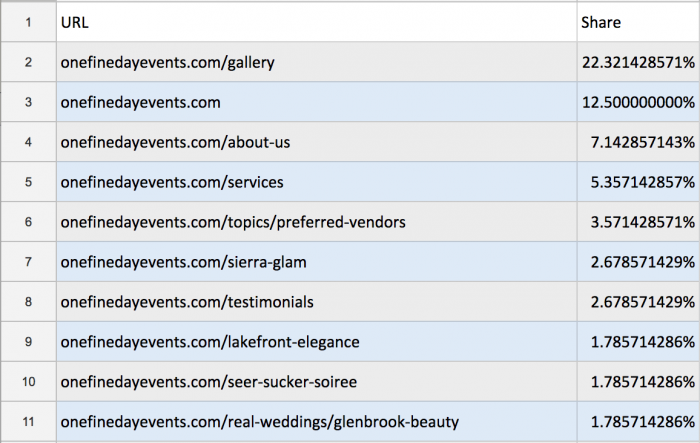
Evaluate each of the top pages and gather three takeaways (20 minutes)
What should Hunter & Company observe?
- Images. The most popular “Gallery” page confirms that images are extremely popular in the wedding and event space. Maintaining an optimized gallery and incorporating more images into content should be a top priority.
- Category pages. Notice that the “Preferred Vendors” page is a Category page. It’s something Hunter & Company should consider adding to their site as well.
- Testimonials. Hunter & Company can collect testimonials to display.
Pro Tip: Use Google Trends to evaluate seasonal searches and prepare competitive content months before it spikes.
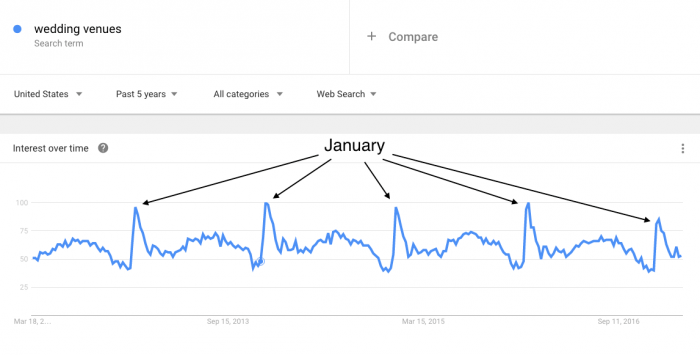
Hack #4: Keep up with “no click” Google searches
We are seeing a big rise in “no click” Google searches.
Here are charts from The State of Searcher Behavior Revealed Through 23 Remarkable Statistics:
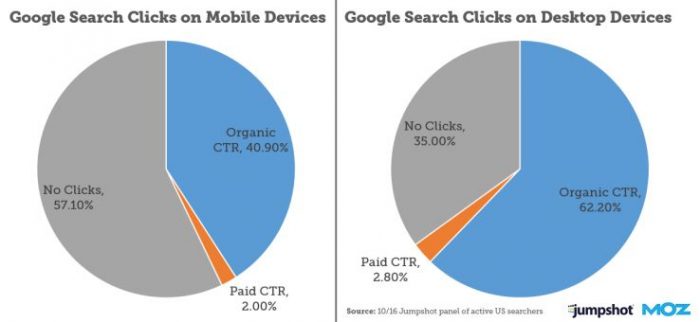
“No click” searches occur when individuals search for something — and find their answer — without ever clicking on a search result.
For example, if you search for “Denver weather,” Google will show you an eight-day weather forecast. Most searchers are satisfied with that and leave, resulting in a “no click” Google search.
“No click” searches are rising because Google continues to provide answers within Search Features like: Featured Snippets (answer boxes), “People Also Ask” Boxes, Knowledge Graphs, Weather Forecasts, etc.
Know which Search Features show up most often for your keywords (5 minutes)
Knowing which Search Features occur most frequently for searches related to your product or service can help you optimize for them.
Keep in mind that if you are page one or two of a desired Featured Snippet search, you are in a better position to get that Featured Snippet (than if you are on page three or further down in search results).
Remember our FAQs about “wedding planning” above? The majority of questions found in Moz Keyword Explorer have Featured Snippets (answer boxes) in their search results:

RealSimple.com currently has a large Featured Snippet for the keyword term “wedding checklist.”
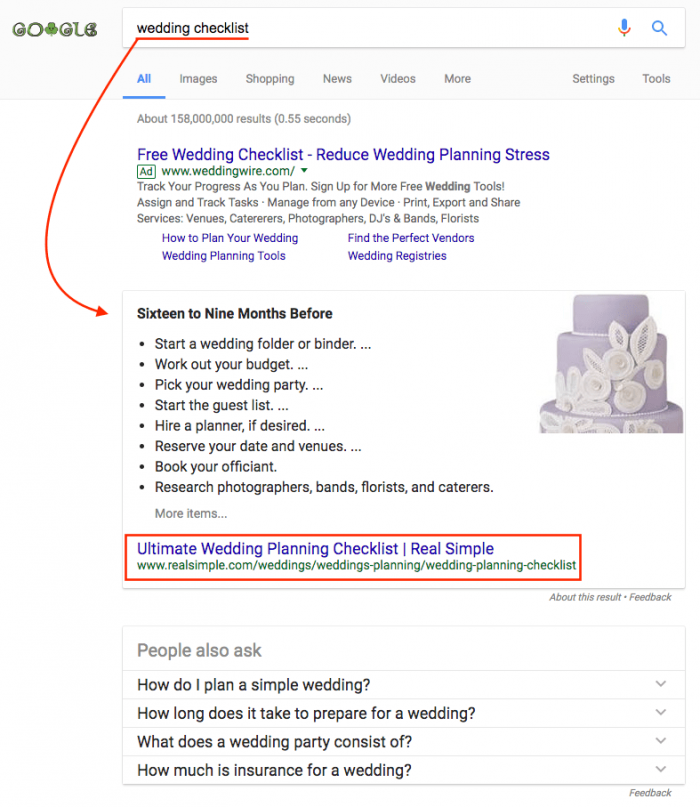
Brainstorm a better wedding checklist (15 minutes)
How could Hunter & Company create a more useful checklist? They could:
- Hire a freelance developer to create a printable wedding checklist calendar that, once a reader enters their wedding date, populates with scheduled to-do list items
- Create an IFTTT (If This Then That) recipe to schedule Google Calendar To-Do Reminders based on the user’s wedding date
- Provide a more beautiful, detailed, user-friendly wedding checklist for their site
Over to you …
Which keyword research method are you most looking forward to trying?
After you’ve performed one of the hacks above, report back and let us know about any interesting discoveries you’ve made.
The post Schedule 30 Minutes to Uncover the Keys to More Powerful Content appeared first on Copyblogger.
No comments:
Post a Comment